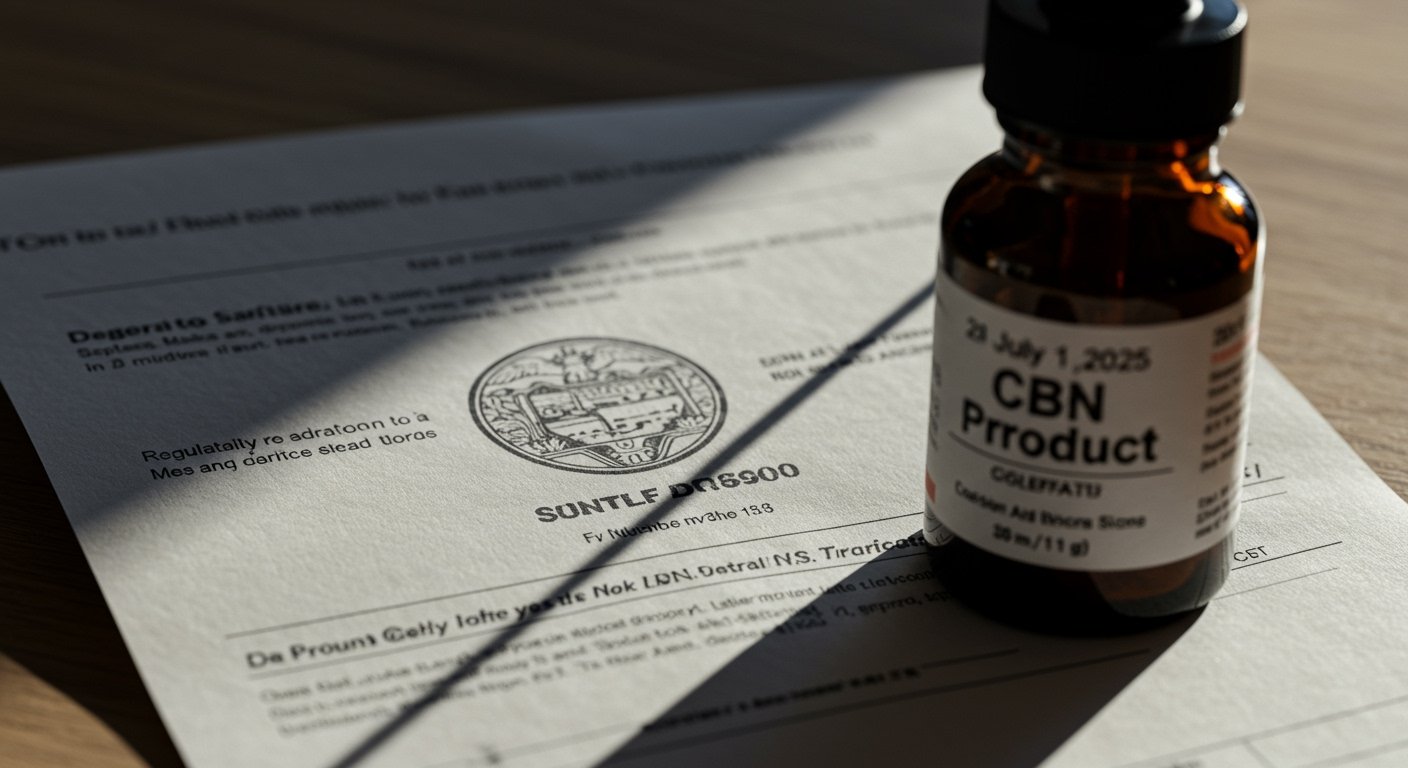Salem, Oregon – Regulators in Oregon have announced a significant change impacting the availability of products containing artificially derived Cannabinol (CBN) within the state’s licensed cannabis system and the broader hemp-derived market. Effective July 1, 2025, the sale of such products to consumers will be prohibited, according to a recent bulletin from the Oregon Liquor and Cannabis Commission (OLCC).
This regulatory shift, formalized through “Bulletin CE2025-05” published on May 15, 2025, introduces stringent requirements for CBN products sold within the state. The prohibition applies unless the manufacturer of the artificially derived CBN has secured a “Generally Recognized as Safe” (GRAS) determination from the U.S. Food and Drug Administration (FDA) or has submitted a New Dietary Ingredient Notification (NDIN) to the FDA and subsequently received a “no objections” response.
CBN, or Cannabinol, is a cannabinoid often associated with aged cannabis. While it can occur naturally, the market has seen an increase in products utilizing CBN produced through chemical synthesis or conversion from other cannabinoids, referred to as artificially derived CBN.
Regulatory Rationale and Background
The OLCC’s decision stems from a regulatory framework that seeks to align state market standards with federal safety considerations, particularly regarding novel or synthesized cannabinoids. The commission indicated in its May 15, 2025 bulletin that, at that time, it was not aware of any artificially derived CBN products currently meeting these specific federal GRAS or NDIN clearance requirements.
This permanent rule was formally adopted on May 15, 2025. It follows a temporary rule that had been in effect since November 2024, which extended the allowance for these products with a clear deadline set for July 1, 2025. The adoption of the permanent rule reinforces the state’s intent to enforce this standard moving forward.
Impact on Licensees and Market Operations
The new rule carries clear and significant consequences for businesses operating within Oregon’s regulated cannabis industry. OLCC marijuana licensees are explicitly prohibited from selling or transferring products containing artificially derived CBN that do not meet the stipulated FDA GRAS or NDIN “no objections” standards after July 1, 2025.
The bulletin outlines specific actions and deadlines for different tiers of the supply chain:
* Retailers: Must remove any non-compliant products containing artificially derived CBN from their shelves and cease sales by the end of the day on July 1, 2025.
* Wholesalers: Are prohibited from distributing or transferring non-compliant products after July 1, 2025.
This means that any inventory of artificially derived CBN products lacking the required FDA clearance will become unsellable within the regulated Oregon market after the deadline. Businesses are urged to audit their product lines containing CBN and verify their compliance status well in advance of July 1, 2025.
Broader Market Implications
The scope of this prohibition extends beyond just the OLCC-licensed recreational marijuana dispensaries. The bulletin specifies that the restriction on the sale of artificially derived CBN products to consumers includes products in both the “OLCC system and the general hemp-derived market” sold within Oregon.
This broader application reflects the state’s comprehensive approach to regulating cannabinoid products, regardless of whether they originate from marijuana or hemp, when they are intended for sale to consumers. Businesses operating solely in the hemp space within Oregon that sell products containing artificially derived CBN will also need to comply with the July 1, 2025 deadline and the FDA clearance requirements.
The change could prompt businesses to reformulate products using naturally derived CBN or seek the necessary federal clearances if they wish to continue utilizing artificially derived forms. Given the OLCC’s statement in May 2025 regarding the lack of known compliant products at that time, the immediate market effect is likely to be a significant reduction, if not elimination, of artificially derived CBN products available for retail sale starting in July.
Looking Ahead
This regulatory update underscores the evolving landscape of cannabinoid regulation as states and federal agencies grapple with novel compounds entering the market. The emphasis on FDA safety pathways like GRAS and NDIN signals a move towards applying standards traditionally associated with food and dietary supplements to certain cannabinoid products.
The July 1, 2025 deadline represents a critical date for Oregon’s cannabis and hemp industries, necessitating immediate action from businesses to ensure compliance and avoid potential enforcement actions. Consumers seeking CBN products in Oregon after this date should be aware of these new restrictions and the potential impact on product availability.



